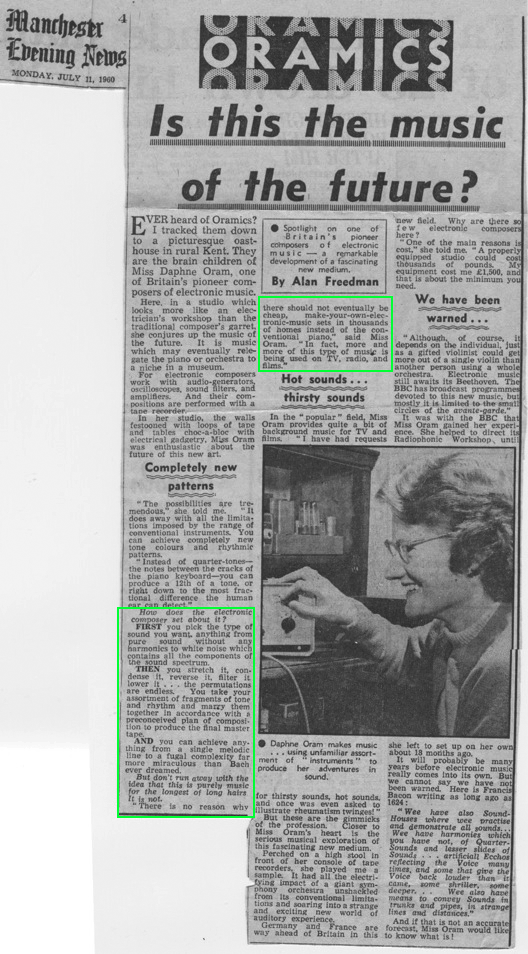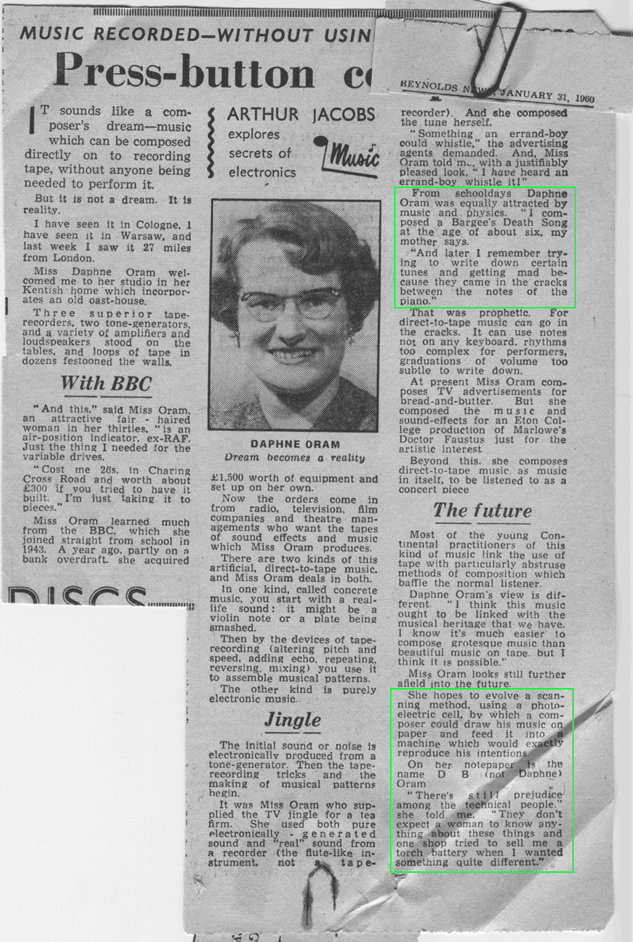
1958 BBC Radiophonic Workshop Formed. First mangers Desmond Briscoe and Daphne Oram.
1959 Daphne Oram leaves BBC.
1960 Delia Derbyshire joins BBC Radiophonic Workshop
12LectureNotes contains additional Daphne Oram content.
1962 Daphne Oram "This is an End Excerpt of "Bird of Parallax" from Oramics released in 2007 I believe. The Full song is an excess of 13 minutes. It was composed during the 60's." http://www.youtube.com/watch?v=i5z5OQbxjOs&feature=related
Daphne Oram documentary - Wee Have Also Sound-Houses
Pictures from http://daphneoram.org/oramarchive/oramics/




12LectureNotes and 12Lab2 contains additional Delia Derbyshire content.
"Delia Derbyshire joined in 1960. She was trained in both music and mathematics, which she had read at Cambridge university. She came to the BBC as a trainee studio manager, and requested to spend her day off sitting in on sessions at the Workshop studio. Her style was not comic, brash or eerie, it was carefully structured, contemplative and very musical. As Roy Curtis-Bramwell explains, "The mathematics of sound came naturally to her and she could take a set of figures and build them into music in a way quite different from anyone else....She stayed on to contribute an enormous amount of very beautiful - almost unearthly - and quite remarkable music." (Briscoe and Curtis Bramwell: 1983, p.83.) http://web.archive.org/web/20060517133312/http://www.sonicartsnetwork.org/ARTICLES/ARTICLE2000JoHutton.html
To begin with Delia thought she had found her own private paradise where she could combine her interests in the theory and perception of sound; modes and tunings, and the communication of moods using purely electronic sources. Within a matter of months she had created her recording of Ron Grainer's Doctor Who theme, one of the most famous and instantly recognizable TV themes ever. On first hearing it Grainer was tickled pink: "Did I really write this?" he asked. "Most of it," replied Derbyshire." http://www.delia-derbyshire.org/index.php
Ron Grainer brought me the score. He expected to hire a band to play it, but when he heard what I had done electronically, he?d never imagined it would be so good. He offered me half of the royalties, but the BBC wouldn't allow it. I was just on an assistant studio manager?s salary and that was it.... and we got a free radio times. The boss wouldn't let anybody have any sort of credit." http://web.archive.org/web/20060517133312/http://www.sonicartsnetwork.org/ARTICLES/ARTICLE2000JoHutton.html
"A recent Guardian article called her 'the unsung heroine of British electronic music', probably because of the way her infectious enthusiasm subtly cross-pollinated the minds of many creative people. She had exploratory encounters with Paul McCartney, Karlheinz Stockhausen, George Martin, Pink Floyd, Brian Jones, Anthony Newley, Ringo Starr and Harry Nilsson. http://www.delia-derbyshire.org/index.php
"'Early electronic music,' explains Mark Ayres, a friend and fellow Doctor Who composer, 'was random atmospheres and sounds generated by electronic equipment, or sounds created by tape manipulation - recorded, looped, re-pitched, and physically cut to create music. In the early Seventies, we got the first synthesizers - machines that could generate those sounds within themselves, with keyboards that helped you to organize them. The problem with these was that they were inherently unstable: if somebody opened the door and the temperature changed, they would go out of tune.' Derbyshire was depressed by the increasing dominance of the synthesis er, which encouraged electronic musicians to abandon atonal work. 'Delia was at her best surrounded by bits of tape,' reflects Ayres. 'In 1973, she was asked to redo the Doctor Who theme with a Delaware [an early synthesis er], and she was very unhappy with the results.'" http://www.guardian.co.uk/theobserver/2002/mar/17/featuresreview.review?INTCMP=ILCNETTXT3487
"By 1973 Delia had become progressively more unhappy with her life at the workshop and she left to join me at Electrophon, an electronic music studio I had set up in Covent Garden. There, unfortunately, she found little relief from her unhappiness and decided to leave London. She became involved, bizarrely, in the laying of the national gas main as a radio operator, she worked in a Cumbrian art gallery, and she worked in a bookshop. In 1980 she met Clive Blackburn, who was to be her partner for the rest of her life. Probably for the first time, she found happiness and settled into what, for her, was a normal existence." http://www.guardian.co.uk/news/2001/jul/07/guardianobituaries1
In the late '90s her interest in electronic music returned and she began working on an album, but sadly, it was never finished, as she died at the age of 64 after cancer treatment. http://www.soundonsound.com/sos/apr08/articles/radiophonic.htm
1968 Delia Derbyshire/Blue Veils and Golden Sand
""This was a documentary program about the Tuareg tribe. The Tuareg tribe are nomads in the Sahara desert and I think they live by bartering, taking salt, I think it was, across the desert. In the piece, the extract you're going to hear, I tried to convey the distance of the horizon and the heat haze and then there's this very high, slow reedy sound. That indicates the strand of camels seen at a distance, wandering across the desert. That in fact was made from square waves on the valve oscillators we've just talked about, but square waves put though every filter I could possibly find to take out all the bass frequencies and so one just hears the very high frequencies. It had to be something out of this world."
http://delia-derbyshire.dyndns.org/BBCScotlandInterview.html#BlueVeils
"I created the music for a TV series called Great Zoos of the World. The producer called the boss and said, 'I want some music made from animal noises.' The boss replied 'That's impossible! But if it's impossible, Delia can do it!' i sorted a tape of twenty-four animal noises into rhythmic ones and tuneful ones and they put it all together. I was very proud of that. -- Delia in the Soundhouse interview" http://wiki.delia-derbyshire.net/wiki/Great_Zoos_of_the_World